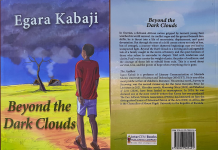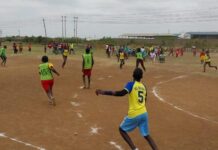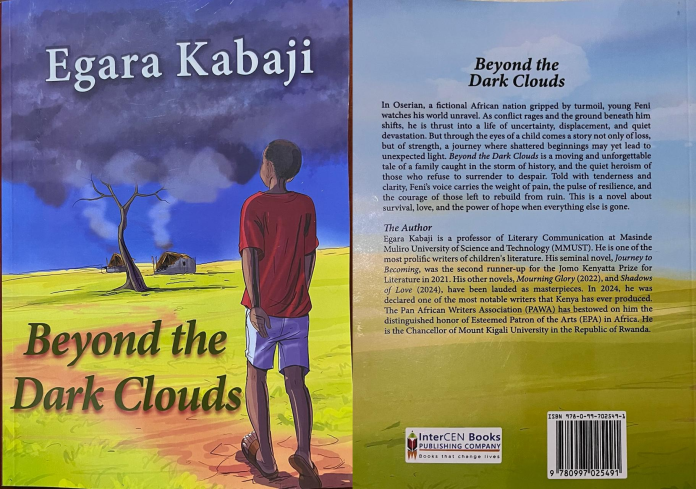- Author: Prof. Egara Kabaji
- Title: Beyond the Dark Clouds
- Pages: 200
- Contact: egarakabaji@gmail.com
- Cost: KSh. 650/-
- Publisher and Year: Intercen Books Publishing Company, 2025
Prof. Egara Kabaji is known to be a gifted storyteller, and his new novel Beyond the Dark Clouds reaffirms this reputation while firmly establishing his place on the literary landscape, not only in Kenya but across Africa. This deeply human and riveting dystopian narrative captures the resilience of an ordinary family trapped in extraordinary circumstances. It is set in Oserian, an imaginary African state ravaged by tribal violence, displacement, and government neglect. The novel speaks to our times, reflecting the fragility of peace in African societies and the devastating consequences when conflict erupts.
The story unfolds through the eyes of young Feni, the novel’s central narrator, whose innocence gives the work its emotional edge. He lives and recounts the violent attack on his family’s village by rival tribes, their desperate flight into a refugee camp, and the seemingly endless struggle to rebuild their lives. Through Feni’s voice, Kabaji offers a child’s perspective on trauma, fresh, unfiltered, and profoundly moving. It is this childlike honesty that makes the story so compelling. Oserian, which once offered Feni a place to dream, suddenly becomes a hostile environment where survival demands maturity beyond his years.
The family’s tragedies are relentless. Feni’s sister, Bigabwenda, is abducted by soldiers and held for four years, during which she is sexually exploited. Her return is not the joyous reunion the family had hoped for. Instead, it exposes the long-lasting wounds of trauma, stigma, and shattered innocence. Feni, despite his tender age, becomes her anchor, walking with her on the path of recovery. His father, Kalao, cannot withstand the psychological toll of the violence he witnessed. His mental health deteriorates until he is beyond help, leaving the family without his protection or guidance.
Most heartbreaking is Feni’s mother, Gemile. She emerges as the novel’s most stoic figure, a woman who shoulders the unbearable weight of keeping her family together. She struggles against the loss of Bigabwenda, the disappearance of her son Sentema, and the death of Apollo, while also caring for a husband consumed by madness. In the refugee camp, she fights to hold on to dignity and survival. Through her, Kabaji paints a portrait of the strong African woman, resilient, unyielding, and determined even in the face of overwhelming despair.
The novel’s characters are vividly drawn and layered with emotional truth. Feni, curious and intelligent, is forced to grow into the family’s pillar. His premature maturity demonstrates how violence robs children of innocence and thrusts them into adult roles. Bigabwenda, though broken by her captivity, emerges as a strong-willed young woman who refuses to be defined by her trauma. She turns her pain into strength, an embodiment of resilience against odds that would have destroyed many others. Sentema, consumed by rage at the government’s betrayal, represents the anger of a generation abandoned by its leaders. He is ready to take justice into his own hands, no matter the cost. Apollo, on the other hand, becomes a tragic victim of extrajudicial killings, his death highlighting the lawlessness that grips Oserian.
Other characters enrich the narrative and widen its scope. Abdi, a shopkeeper in the refugee camp, is a minor figure yet plays a crucial role. Through his kindness, he brings people together and even helps Feni secure professional help for Bigabwenda, a step that transforms her healing journey. Ariho, another significant character, embodies resilience. Despite her childhood struggles, she pushes herself to complete her education and later uses her story to encourage others at the Intercultural Centre for Peace and Restoration. Her mother Dorika’s rejection by her own community for being unmarried reveals the cruelty of cultural norms that strip women of belonging and dignity. Finally, the intervention of Mr. GM, a compassionate well-wisher who changes the destiny of Feni’s family, reminds readers that humanity’s saving grace lies in acts of generosity and solidarity.
Kabaji uses these interwoven lives to critique both cultural and political systems that perpetuate suffering. Through Ariho and Dorika, the novel questions traditions that marginalize women, reducing their worth to marital status and conformity to oppressive customs. Through Apollo’s death and Bigabwenda’s ordeal, it indicts a government that fails to protect its citizens, abdicates responsibility for refugees, and even takes credit for rescues it did not accomplish. The novel is unflinching in portraying a state where the vulnerable suffer while the powerful exploit their pain for political gain.
Sexual exploitation of women and girls emerges as one of the novel’s most haunting themes. Kabaji does not shy away from showing the psychological scars of rape, the weight of stigma survivors carry, and the silence of justice systems that allow perpetrators to walk free. Bigabwenda’s long captivity and her struggle to reintegrate expose the layers of trauma, personal, familial, and societal, that victims must navigate. The novel insists that healing requires not only personal strength but also community and psychosocial support, both of which remain scarce in conflict situations.
Despite its unrelenting tragedies, Beyond the Dark Clouds is ultimately a story of hope. It insists that even in the bleakest circumstances, acts of kindness and resilience can light the path forward. Abdi’s compassion, Ariho’s determination, and Mr. GM’s generosity stand as counterpoints to violence and despair. At the heart of this hope is Feni himself, the young boy whose premature maturity transforms him into a source of strength for his family and a beacon of hope for his community.
Kabaji’s novel also operates as an allegory for many African nations grappling with ethnic divisions, fragile governance, and cycles of violence. Oserian may be fictional, but its struggles mirror those of real societies across the continent. By choosing a child narrator, Kabaji ensures that the reader cannot escape the moral weight of these stories. Feni’s voice is not just that of one boy; it becomes the voice of countless children caught in wars they did not start, bearing scars they did not deserve.
Beyond the Dark Clouds is a remarkable contribution to Kenyan and African literature. It captures the cost of conflict with unflinching honesty while also illuminating the strength of the human spirit. It is a novel that compels us to reflect on our societies, our governments, and our cultural practices, while reminding us that even beyond the darkest of clouds, there remains a horizon of hope.
YOU MAY ALSO READ: BOOK REVIEW: A Journey to Becoming
Mbukha Shitemi is a member of the Kakamega Book Club and works as an Office Administrator in the Registrar, Academic Affairs office, at Masinde Muliro University of Science and Technology (MMUST).








































